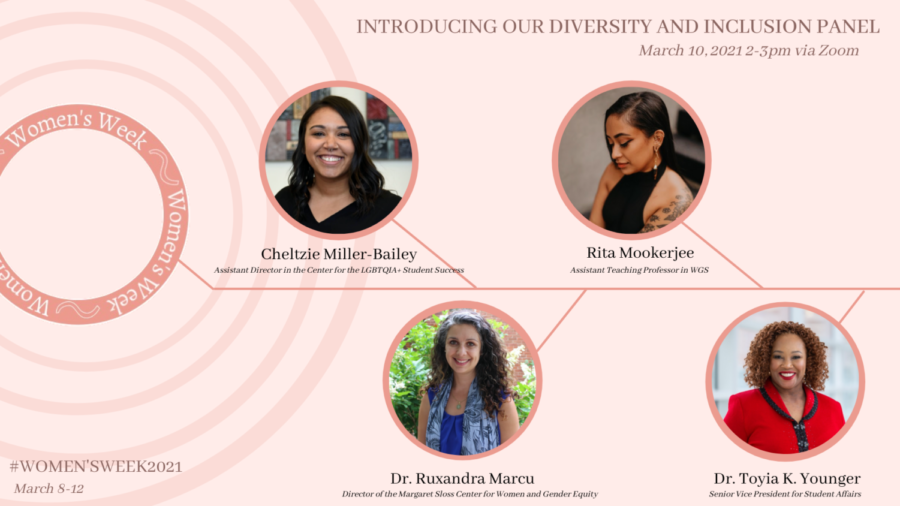Focusing on diversity and inclusion at Iowa State
March 10, 2021
Iowa State’s Women’s Week’s latest installment was a panel focusing on diversity and inclusion.
To begin the conversation, the panelists were asked to define the term intersectionality.
Rita Mookerjee, an assistant teaching professor in the women’s and gender studies program at Iowa State, looked to lawyer and critical race theory scholar Kimberlé Crenshaw for her answer.
Mookerjee used the analogy of traffic to define intersectionality.
“When we think about literal traffic intersections, there are vehicles travelling in many different directions,” Mookerjee said.
Mookerjee continued to say while some vehicles may have a simple path to follow from point A to point B, many vehicles must follow a more challenging road, which may lead to collisions. According to Mookerjee, it is the points of connectivity in collisions that represent intersectionality, some examples being race, gender, age, language, location and ability.
Cheltzie Miller-Bailey, the assistant director of the Center for LGBTQIA+ Student Success, added that intersectionality affects people in privileged identities as well.
“It’s [intersectionality] the interconnectedness of social systems and identities impact a person’s life and experiences,” Miller-Bailey said.
The panelists were then asked how their intersectionality has affected their work.
Toyia Younger, senior vice president of Student Affairs at Iowa State, spoke about her own experiences.
“… I’ve been in situations where not only was I the only woman, I was the darkest person sitting around that table and I was the youngest person,” Younger said.
Sandra Marcu, director of the Sloss Center for Women and Gender Equity, touched on how one very important part of her intersectionality, being an immigrant, affects her work.
“In my case, my being an immigrant informs the fact that I’m always looking to center and highlight the stories of our immigrant students […] It’s at the core of my being — I can’t not talk about immigration issues and build them into my feminism and the feminist work that our center does today,” Marcu said.
Miller-Bailey focused on how her professional title often trumps the other aspects of who she is.
“For the first time, I’m a lot more aware of how people consider my sexual orientation and my gender identity before they consider my full sense of self,” Miller-Bailey said. “It’s difficult for some people to understand that I’m a full person, that there is significantly more to me than that I support LGBTQIA+ students on this campus.”
Miller-Bailey continued to say that because she is often labelled as only one of her traits, she is more focused on seeing and supporting the totality of students.
The conversation then shifted to how fellow women of color who come from different backgrounds can come together and support each other on campus.
Mookerjee said one way to support other women of color is by giving credit where credit is due.
“A great debt is owed to Black women that is rarely acknowledged or expanded to the extent that it should be to accurately represent history,” Mookerjee said.
Miller-Bailey added, “When you have a privilege and an opportunity to uplift a different experience within the realm of womanhood, […] it is our responsibility to do that. We have to be willing to have conversations and learn about the experiences of other women […] and uplift them when people aren’t willing to listen to them do it themselves.”
The discussion closed with a conversation about the struggles Iowa State LGBTQIA+ women are facing and what resources are being offered.
Miller-Bailey and Marcu focused on the lack of data Iowa State has on the experiences of LGBTQIA+ women.
“We then make strides and make comments that we’re supporting women and doing all of these really phenomenal things in support of women, and we’re actually doing it in support of cisgender women,” Miller-Bailey said.
In conclusion, Miller-Bailey urged LGBTQIA+ students and allies to read through Iowa State’s transgender guide to learn how to uplift and support women in their journeys.

















